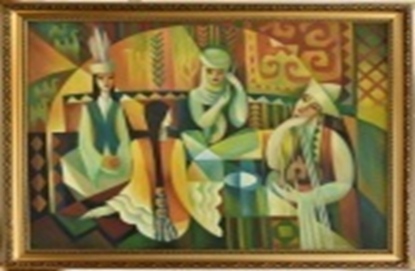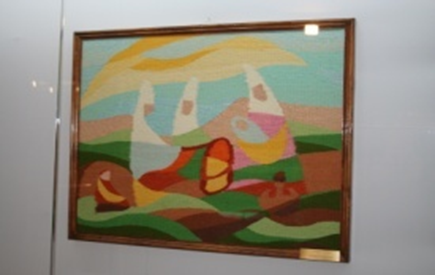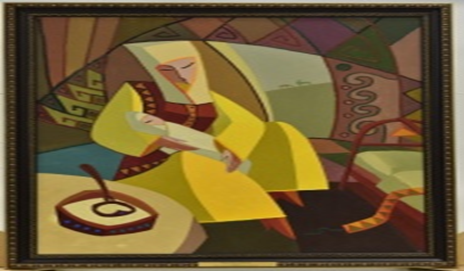Shildekhana/ Holiday, held in honor of a newborn.
Protection (up to forty days) is one of the customs, associated with the birth of a child. An essence of this ritual boils down to the trust in the “security” and protection of the newborn. That’s why, it is called the security (protection). The Persian word “Shilla” (“chille”) means “fourty”. In the traditional Kazakh society, a period of up to 40 days had been considered as a dangerous period for a child and mother. Prior to the time mentioned, a large number of people were not allowed to approach them, and the child and his mother were well cared for.
Especially in the house, where the baby is, the candles were lit and “guarded” for three (sometimes, up to 40 days) days. There is the “Zharys kazan” tradition among the people (a ritual, performed for a woman to give the birth without any problems in a favorable environment, and for the baby to have an easy, fortunate and happy life) that turned into a celebration of “Shildekhana”. A holiday, held in honor of a newborn, is called the “Shildekhana” (shildelik). Basically, the relatives and neighbors come to the party, mostly uninvited. According to the tradition, they shower the guests with sweets, saying: “May the baby be healthy and strong!” Depending on whether the child is a boy or a girl, they give a saddle or a ring and the earrings made of silver.

The yurt. Author: B. Zauyrbekova
From the Fund of the National Museum of the Republic of Kazakhstan
Being in joy of the event, someone may even sincerely give a horse. Along with this, during the holiday, the respected old man from the elder generation gives a blessing to the child, saying:
Let’s raise the wrist,
Let’s fill the heart with light.
Let’s give a parting word for our baby,
We will express our sincere wishes.
Let our baby be cute,
Let him have a passion for the art and knowledge.
Let him become your protector and support,
May the faith always accompany him, and may everything prosper for him!
And let him choose a right and good path...
Amen to the Greatness of Allah!

Lullaby song. Author: B. Atyraubayev
From the Fund of the National Museum of the Republic of Kazakhstan
After the elder people gave their blessing, ate from the festive table and dispersed, the young peoplewere staying overnight in this house, where the songs were sung and the national kyuis were performed until morning. Basically, these entertainments for young people had lasted for three days in a traditional environment. Thus, Kazakh songs penetrated into the ears of the newborn. Nevertheless, if you do not take into account the day of celebration, then it was not customary to invite many people until fourty days after the birth of the baby. Actually, it was considered that people could jinx a child and a mother. The guests who came did not try to see them, believing that “The daughter-in-law can be jinxed”, “A baby can get cold”. Moreover, they only expressed their wishes for a good health of the newborn.

Lullaby song. Author: Qabdyl-Galym Karzhassov
From the Fund of the National Museum of the Republic of Kazakhstan
In order to make the laboring woman’s teeth and bones stronger, they give her a dish, made from the cervical vertebra of an animal. Other daughters-in-law try to taste a dish, called “Kalzha”, with the intention of having children.
Kalzha is a lamb dish, prepared for a woman in labor. To prepare this dish, the fattest sheep is slaughtered, which is selected in advance. This dish, especially the soup, helped the weakened mother to gain the strength and recover. At the same time, the mothers-in-law paid a great attention to the fact that the “Shilde ter”, that is an excess fluid accumulated during the pregnancy, was eliminated from the body.
There was a popular belief that a woman in labor who did not use the kalzha along with the child, would be subjected to various troubles. A process of sweat removal is one of the mandatory actions after a woman gives the birth. For this purpose, the woman in labor was given the mutton soup, called “kalzha”. It was considered that an energy lost by a woman during the childbirth is restored while eating the soup, and when she sweats, her pain comes out through the sweat.
In addition, due to the fact that the woman in labor has the weak bones and teeth, she is allowed to “gnaw” the bone of a slaughtered animal. The mother-in-law and the daughter-in-law’s mother make sure that the woman in labor eats a hot soup, drinks tea with butter, and as a result, begins to sweat. The warmth wraps the daughter-in-law and she warms up very well. After that, they change their clothes, putting on the clean ones. Thus, it is the best way to sweat several times until the “shilde ter” (postpartum weakness of the woman) is completely released; in society, there was a belief that the daughter-in-law, whose “shilde ter” (postpartum weakness of the woman) did not come out, would be weak. After all this, it was believed that the child and mother could get sick even from the flapping of a swallow’s wings, before the expiration of fourty days. So, even in summer they dressed warmly. If mom has a cold in her teeth, then there is a risk of losing all her teeth. And, if a woman inadvertently caught a cold in her teeth, then she had to rinse her mouth with the warm blood of a freshly slaughtered animal.
Furthermore, the “Shildekhana” was used to take place in the neighboring house as a national entertainment evening, as a continuation of the celebration.




